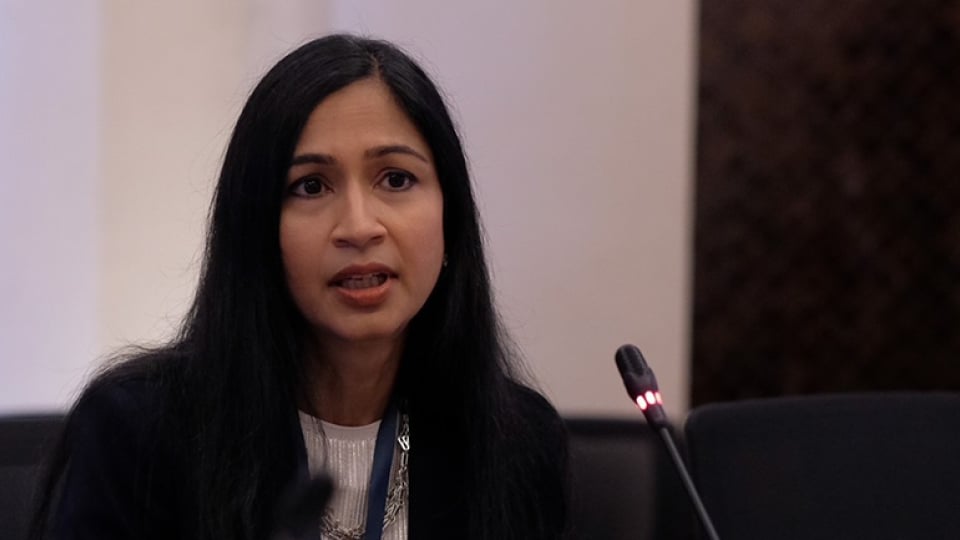Forging a Better Future: One OBGYN's Hopes for the Future of Women’s Health

- This Is Bayer
- Agriculture
- Consumer Health
- Pharmaceuticals
- Products
- Community
- News & Stories
- Careers
- This Is Bayer
- Agriculture
- Consumer Health
- Pharmaceuticals
- Products
- Community
- News & Stories
- Careers
Throughout their lives, women have a range of evolving health needs, from menstruation, birth control, and pregnancy to post-natal care and menopause management. Yesmean Wahdan, MD, VP, U.S. Medical Affairs, Bayer Women’s Healthcare, a former practicing OBGYN, shares her vision for the future of women’s health.
Despite years of research dedicated to women’s health, it can often feel as if we are always a step behind in achieving the progress women need. The result? Monumental and celebration-worthy advancements, yes, but also persistent, significant gaps in women-centered research and empathetic care that feed health inequities.
As I reflect on this complex history, I am often reminded of a quote from the world-renowned American author and abolitionist, Harriet Beecher Stowe, “A woman’s health is her capital.” Her words are a powerful reminder of why we must champion access to the care and resources women need to make decisions about their own health and the health of their families.
As part of my work, I often get the privilege of participating in conversations with fellow women’s health advocates with a passion for improving women’s healthcare. Each of us brings our own distinct experience and vision for the future as healthcare providers, advocates, scientists, innovators, and champions of gender parity. This unique range of perspectives demonstrates both the progress we have made and just how much more work we have ahead to ensure women’s health journeys are met with the care they deserve.
Inspired by fellow advocates and infused with an optimism for continued progress, I want to share my hopes for what the future of women’s health will entail:
A future… in which women have unfettered access to contraception and accurate family planning education
Having the autonomy to choose if and when to start a family can carry significant influence as to women's opportunities across society. Beyond merely preventing pregnancy, contraception empowers women to make independent decisions about their own bodies, plan their futures, and that of their families. However, obtaining access to contraceptive services and education remains difficult for many women – particularly those in historically underserved communities.1 With misinformation and disinformation on the rise, it is with these challenges in mind that our team continues to work tirelessly to ensure that quality and informed care is accessible to all women throughout their lives, regardless of their socio-economic status or geographic location.
One way Bayer is helping to accomplish these goals is through partnerships. Our work with organizations like Direct Relief, which provides low-cost or no-cost IUDs to women who qualify, and others that bring women’s healthcare directly into communities who need it most, address the challenge of access through product donations, grants, and education – contributing to our goal to provide 100 million women worldwide with access to modern contraceptives by 2030.2
This optimistic vision for the future is also made more real by the countless advocates and organizations that we often speak alongside to tackle women’s health advocacy issues. In the coming months, our team will participate in events across the country with leading women’s health organizations to help dispel current challenges we face as a society related to misinformation and disinformation, empowering women with knowledge to make educated decisions related to their personal healthcare journeys. We will also continue to bring together a diverse group of people to ensure that the voices of patients, advocates and healthcare professionals will remain involved, as together we can help move the dial on these critical issues which we hope will make a lasting impact for generations to come.
A future… in which menopause symptoms are better understood and treated
Just as we must ensure that our actions support greater access to care, we also hold a responsibility to uplift women by discussing their needs openly and without reservation. This is especially important in the case of menopause.
By 2030, the world population of menopausal and postmenopausal women is projected to increase to 1.2 billion, with an estimated 1.3 million new entrants each year in the U.S. alone.3,4 With increased longevity, menopause management is of growing importance. And yet, until recently, the health impacts of menopause have been largely ignored and dismissed due to negative stigmas, insufficient funding, sex bias in research, and lingering misinformation.5
As we look ahead, we must continue to find ways to break the idea that menopause symptoms are something women must live with and, instead, aim to give it both the clinical attention and cultural recognition it deserves. People, healthcare providers and employers have a role to play in this transformation. At Bayer, we do this through our research as well as contributing to efforts that will change the way menopause is viewed and dealt with at work, partnering with advocacy and government organizations to create guidance and resources that will help companies – including ours – better support women in the workforce. Through these initiatives, we hope to help contribute to a future without menopause stigma – for the women we serve globally as well as the women across our workforce, creating safe spaces for these conversations.
A future… where biological sex doesn’t dictate health outcomes
It may be surprising to some, but the reality is that the inclusion of women of childbearing years in early clinical research was not put into law until 1993 – and the impact of this cannot be underestimated.6 For decades, medicines critical to a wide swath of health conditions that impact all of us had been predominantly studied in men. While new trials are committed to better representation of women (as well as a diverse range of people of all ages, races, and ethnicities), there is still more work to be done.
The general infancy of inclusive research has contributed to inequities in healthcare. A convergence of absent or incomplete scientific information about the unique aspects of female biology, along with societal misperceptions, has led us to this game of catch up. Unfortunately, this is not specific to health issues that people with female reproductive organs face – like female cancers or menopause – but to conditions that present regardless of biological sex. While advances have been made, women continue to be underrepresented in research studies across several fields, including cardiovascular disease, mental health, and cancer, despite representing a significant proportion of these disease populations.7
Making this future a reality requires a collective effort – across communities, healthcare institutions, and the pharmaceutical industry. Together, I am confident that we will continue dismantling these barriers to help ensure that every woman can feel empowered and secure in her reproductive choices and lifelong health. Ultimately, we will help build a world where women’s healthcare is universally accessible, and respected.
References:
1. Sutton MY, Anachebe NF, Lee R, Skanes H. Racial and Ethnic Disparities in Reproductive Health Services and Outcomes, 2020. Obstetrics & Gynecology. 2021;137(2):225-233. doi:10.1097/AOG.0000000000004224
2. 100 Million Women by 2030 – Choice for Every One of Them | Bayer Global. Accessed May 7, 2024. https://www.bayer.com/en/news-stories/100-million-women-by-2030-choice-for-everyone-of-them
3. Hill K. The demography of menopause. Maturitas. 1996;23(2):113-127. doi:10.1016/0378-5122(95)00968-X
4. Peacock K, Carlson K, Ketvertis KM. Menopause. StatPearls Publishing; 2024. Accessed March 26, 2024. https://www.ncbi.nlm.nih.gov/books/NBK507826/
5. Barber K, Charles A. Barriers to Accessing Effective Treatment and Support for Menopausal Symptoms: A Qualitative Study Capturing the Behaviours, Beliefs and Experiences of Key Stakeholders. Patient Prefer Adherence. 2023;Volume 17:2971-2980. doi:10.2147/PPA.S430203
6. Institute of Medicine (US) Committee on Ethical and Legal Issues Relating to the Inclusion of Women in Clinical Studies. Women and Health Research: Ethical and Legal Issues of Including Women in Clinical Studies. Vol 1. (Mastroianni AC, Faden R, Federman D, eds.). National Academies Press (US); 1994. Accessed March 26, 2024. https://www.ncbi.nlm.nih.gov/books/NBK236539/?report=reader
7. Sosinsky AZ, Rich-Edwards JW, Wiley A, Wright K, Spagnolo PA, Joffe H. Enrollment of female participants in United States drug and device phase 1–3 clinical trials between 2016 and 2019. Contemp Clin Trials. 2022;115:106718. doi:10.1016/j.cct.2022.106718









